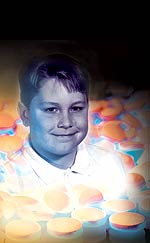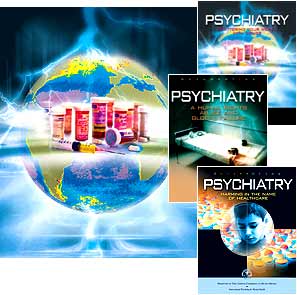
|

Saying “No” to Psychiatric Child Drugging

An ALMA award nominee for her starring role in the NBC telefilm “The Princess and the Marine”, Marisol Nichols is also a winner of a Golden Eagle award for “most promising actor or actress.” After her three-year stint playing the feisty and passionate Victoria Santiago in Paramount’s groundbreaking drama “Resurrection Blvd” (set in LA), she has starred this year in episodes of “Law and Order”, “Friends”, “Alias”, “Twilight Zone” and “The Division” — and just finished filming “Homeland Security” a new NBC movie.
|
|
One of Hispanic America’s most popular TV actresses, Marisol Nichols is also a spokesperson for the Citizens Commission on Human Rights (CCHR), an international organization headquartered in Hollywood, which focuses on the misdiagnoses of learning and behavior disorders that have resulted in the unnecessary drugging of our nation’s children.
Ability magazine, a celebrity contemporary publication that focuses on health, wellness and human potential, recently interviewed Ms. Nichols. The subject: the psychiatric industry’s mislabeling of children with so-called “behavior disorders.” Freedom, with Ability’s permission, excerpts this interview by Chet Cooper.
CHET: What attracted you to CCHR?
MARISOL: I have my own history of being mislabeled as someone with a behavior disorder. I didn’t like that. I was told I had this problem and that problem and this problem, when none of it was true. I’m just an actor and I didn’t know it. I was creative...
CHET: A different drummer.
MARISOL: Exactly. That’s all. When I heard about CCHR, I was surprised to find that there’s an organization that knows about this stuff. The main thing I was interested in was the fact that there are children even under the age of five being labeled with a mental disorder such as ADHD [Attention Deficit Hyperactivity Disorder] or ADD [Attention Deficit Disorder] or chemical imbalance — yet with no blood work, no lab test, nothing. Students are merely observed and then put on these really powerful mind-altering drugs with side effects like violence, suicide, this, that, the other. And they’re putting five-year-old kids on this? That does not seem right. My brother was put on a drug like that. I don’t understand why children aren’t being taught to read. If a kid doesn’t know the alphabet, damn right he’s going to get fidgety in class. He’s going to have trouble paying attention if he doesn’t even know how to read. They took phonics out of the school. That’s how I learned to read. You know... you sound out the word, you look it up in the dictionary to find out what the word means, and you put it together. And different letters of the alphabet make different sounds and that’s how you know how it works. I don’t understand why that isn’t being used anymore.
The kids are saying, “Oh, I have a disorder because the teacher said I do. I don’t pay attention in class and I chew my pencil and my mind wanders.” I mean, some of the characteristics of those being diagnosed are...

MATHEW SMITH was forced by his school to take a psychiatric stimulant to help him “focus” better. In 2000, at age 14, he died of a heart attack that a coroner attributed to the prescribed stimulant.
|
CHET: ... I’m sorry. (staring out the window) Can you repeat that? (smile)
MARISOL: Right! You have a disorder! (laughs) That’s some of the criteria — mind wanders, fidgets in class, interrupts teacher. Anybody could be put under that. And then to be told they have a chemical imbalance? I mean, where’s the lab test? Do they ever go to the doctor and get a physical examination for their chemical imbalance? No. It’s a checklist that the teacher looks at. That makes no sense to me. That, to me, is totally wrong. Some parents are being told that if they don’t put their child on it, their child is going to be taken away. That is wrong!
There was a law that was passed in 1975 for disabled children in the schools. There was money given to help educate children who were blind, deaf, speech impediment, hearing impaired, etc. In the ‘90s, it included mental disabilities, such as ADHD. All this money is now being funneled towards that.
It is no longer about disabled children that actually need the attention. It is more about having these kids getting their drugs every three hours...
These drugs are powerful, mind-altering drugs. So, if you have a kid that is bouncy and alive and wants to play, you’ve now subdued him. This is not an animal. This is a child.
There are plenty of studies that interview parents that say, “...My child is not the same. This is not my child.” Half of these children were vibrant and alive. What did they eat before they came into class? You feed them Coca-Cola and donuts and then they go into the class and they’re wild. Well, half of it is their diet. Do they have a food allergy? Get some kind of physical examination before you label a kid automatically disabled and give him drugs. Now, the kid will say, “Oh, well I can’t learn because I have this problem.” As opposed to, “Maybe I need a tutor.”
CHET: Tell me about your experience of being labeled with a behavioral disorder.
...........................
“I have my own history of being mislabeled as someone with a behavior disorder. I didn’t like that. I was told I had this problem and that problem and this problem—when none of it was true.” — Marisol Nichols
...........................
|
|
MARISOL: I was one of those kids in class who was bored with the teaching. I didn’t understand a lot. I missed some things early on. So, eventually, I started just not going. I needed some kind of creative outlet and I couldn’t find one. So, I just left. So, I got labeled (through the school counselor) as having a behavior disorder because I didn’t want to sit in class all day.
Eventually, I was sent to a school for kids with cognitive disabilities. So, instead of being tutored or having one-on-one instruction, kids my age who were a little rebellious, or didn’t agree with everything, were being bussed to schools where the education level was way too low. I was identified with all these labels. I didn’t know I was aggressive. I didn’t know I had low self-esteem.
These are labels I carried around with me for ten years. I thought that that was me. What I really needed was some kind of tutor or somebody to explain to me why I can’t figure out Algebra. I figured I was just dumb.
CHET: How did you find your way out of that label?
MARISOL: I found acting in junior college — I was still trying to figure out Algebra. (laughs) I tried out for a play and got the lead role. I was scared out of my mind and shocked. As soon as I started doing it, I thought, “This is fantastic! This is what I was looking for!” I changed all my classes to theater classes. I found what I was interested in and it just followed suit... that was it.
It is interesting that I did this in college because in high school I would have never even tried because of the stigma I was carrying around with me. I thought I had some kind of disorder and that there was nothing I could do about it. Fortunately, drugs were not that prevalent. The kids on Ritalin were a little off and it seemed like the drug was making them like that. So I never wanted to take it...
I was one of those children that was sent to a psychiatric hospital. My parents were told by my school that it would help...
One of the things I want to do is to tell teenagers and parents my story. Nancy Cartwright’s [the voice of Bart Simpson] story is interesting. Her son’s school told her that he had a mental disability and that he needed to be put on drugs. She said, “No,” and she took him to an allergist. It turns out that he is allergic to wheat and sugar. She changed his diet and he was totally fine. It was that simple. This kid would have been on a powerful, mind-altering drug — Prozac, Zoloft, Ritalin — all because of allergies.
A lot of the behaviors that the drugs are prescribed for — obstinacy, argumentativeness, rebelliousness — are sometimes normal teenage stuff and it is wrong to label it as a disease. Also, many side effects from the drugs are the same symptoms that the drugs are prescribed for — violence, suicide. Plus, the drugs are addictive. The parents aren’t told this when their kids are put on drugs. To take a kid off the drugs they have to be weaned off. That’s pretty scary for an 8-year-old that maybe just needed a tutor...
Permission granted by Ability Magazine (www.abilitymagazine.com).
|
Harming in the name of Help
|
 The Citizens Commission on Human Rights (CCHR) has published a series of booklets which thoroughly document psychiatric harm, abuse, criminality and fraud in different zones of society.
The Citizens Commission on Human Rights (CCHR) has published a series of booklets which thoroughly document psychiatric harm, abuse, criminality and fraud in different zones of society.
The first of the series, Creating Racism, Psychiatry’s Betrayal, set off an international firestorm of controversy about psychiatry.
The latest publication, Harming Lives — Psychiatry Betraying & Drugging Children, documents how the fraud of “educational disorders” is carried out for the enrichment of those who profit from psychiatric drugs — at the expense of our nation’s school children.
With more than four million American children alone fraudulently labeled as having mental “disorders,” psychiatrists are creating a generation of drug addicts.
To obtain copies of these booklets, contact:
Citizens Commission on Human Rights
6616 Sunset Blvd.
Los Angeles, CA 90028
(323) 467-4242 or (800) 869-2247.
|
|
|

|

